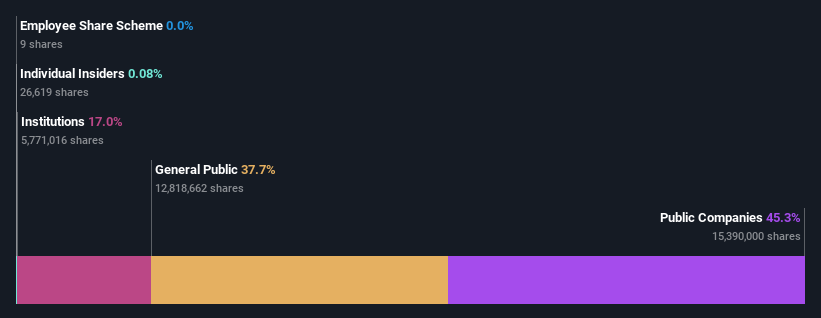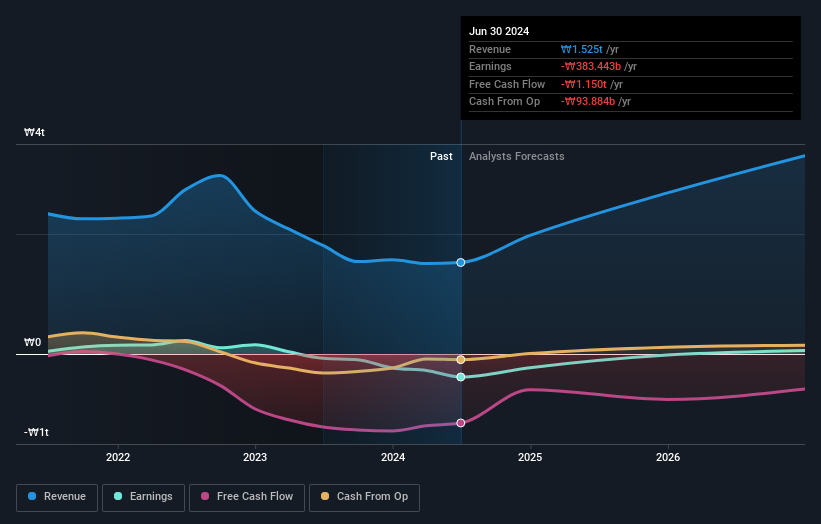- South Korea
- /
- Chemicals
- /
- KOSE:A011790
While individual investors own 38% of SKC Co., Ltd. (KRX:011790), public companies are its largest shareholders with 45% ownership

Key Insights
- The considerable ownership by public companies in SKC indicates that they collectively have a greater say in management and business strategy
- 51% of the business is held by the top 2 shareholders
- Institutions own 17% of SKC
A look at the shareholders of SKC Co., Ltd. (KRX:011790) can tell us which group is most powerful. We can see that public companies own the lion's share in the company with 45% ownership. Put another way, the group faces the maximum upside potential (or downside risk).
Meanwhile, individual investors make up 38% of the company’s shareholders.
In the chart below, we zoom in on the different ownership groups of SKC.
See our latest analysis for SKC

What Does The Institutional Ownership Tell Us About SKC?
Many institutions measure their performance against an index that approximates the local market. So they usually pay more attention to companies that are included in major indices.
We can see that SKC does have institutional investors; and they hold a good portion of the company's stock. This implies the analysts working for those institutions have looked at the stock and they like it. But just like anyone else, they could be wrong. It is not uncommon to see a big share price drop if two large institutional investors try to sell out of a stock at the same time. So it is worth checking the past earnings trajectory of SKC, (below). Of course, keep in mind that there are other factors to consider, too.

SKC is not owned by hedge funds. Our data shows that SK Inc. is the largest shareholder with 45% of shares outstanding. Meanwhile, the second and third largest shareholders, hold 5.8% and 2.3%, of the shares outstanding, respectively.
To make our study more interesting, we found that the top 2 shareholders have a majority ownership in the company, meaning that they are powerful enough to influence the decisions of the company.
Researching institutional ownership is a good way to gauge and filter a stock's expected performance. The same can be achieved by studying analyst sentiments. Quite a few analysts cover the stock, so you could look into forecast growth quite easily.
Insider Ownership Of SKC
While the precise definition of an insider can be subjective, almost everyone considers board members to be insiders. Management ultimately answers to the board. However, it is not uncommon for managers to be executive board members, especially if they are a founder or the CEO.
Most consider insider ownership a positive because it can indicate the board is well aligned with other shareholders. However, on some occasions too much power is concentrated within this group.
Our most recent data indicates that insiders own less than 1% of SKC Co., Ltd.. It is a pretty big company, so it would be possible for board members to own a meaningful interest in the company, without owning much of a proportional interest. In this case, they own around ₩3.8b worth of shares (at current prices). It is always good to see at least some insider ownership, but it might be worth checking if those insiders have been selling.
General Public Ownership
With a 38% ownership, the general public, mostly comprising of individual investors, have some degree of sway over SKC. While this size of ownership may not be enough to sway a policy decision in their favour, they can still make a collective impact on company policies.
Public Company Ownership
Public companies currently own 45% of SKC stock. We can't be certain but it is quite possible this is a strategic stake. The businesses may be similar, or work together.
Next Steps:
It's always worth thinking about the different groups who own shares in a company. But to understand SKC better, we need to consider many other factors. To that end, you should learn about the 2 warning signs we've spotted with SKC (including 1 which is a bit concerning) .
If you would prefer discover what analysts are predicting in terms of future growth, do not miss this free report on analyst forecasts.
NB: Figures in this article are calculated using data from the last twelve months, which refer to the 12-month period ending on the last date of the month the financial statement is dated. This may not be consistent with full year annual report figures.
New: Manage All Your Stock Portfolios in One Place
We've created the ultimate portfolio companion for stock investors, and it's free.
• Connect an unlimited number of Portfolios and see your total in one currency
• Be alerted to new Warning Signs or Risks via email or mobile
• Track the Fair Value of your stocks
Have feedback on this article? Concerned about the content? Get in touch with us directly. Alternatively, email editorial-team (at) simplywallst.com.
This article by Simply Wall St is general in nature. We provide commentary based on historical data and analyst forecasts only using an unbiased methodology and our articles are not intended to be financial advice. It does not constitute a recommendation to buy or sell any stock, and does not take account of your objectives, or your financial situation. We aim to bring you long-term focused analysis driven by fundamental data. Note that our analysis may not factor in the latest price-sensitive company announcements or qualitative material. Simply Wall St has no position in any stocks mentioned.
About KOSE:A011790
SKC
Manufactures and sells basic chemical raw materials and copper foils for batteries.
High growth potential very low.
Similar Companies
Market Insights
Community Narratives




